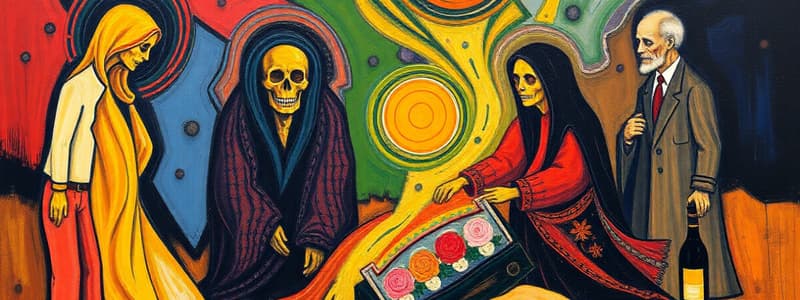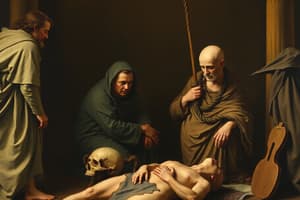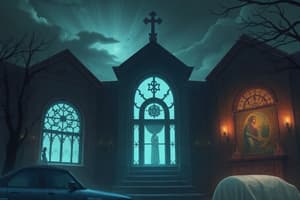Podcast
Questions and Answers
According to Turner and Edgley, what theatrical element are American funerals?
According to Turner and Edgley, what theatrical element are American funerals?
Performances
Whose work does the article use to compare life to a stage?
Whose work does the article use to compare life to a stage?
Erving Goffman
What is one of the roles that funeral directors take on during a funeral?
What is one of the roles that funeral directors take on during a funeral?
Stage managers
What is the term for the specialized labor performed by funeral professionals?
What is the term for the specialized labor performed by funeral professionals?
Name one item or element that is considered a prop in the theatrical performance of a funeral.
Name one item or element that is considered a prop in the theatrical performance of a funeral.
Why do funerals help society maintain cultural beliefs about life and death?
Why do funerals help society maintain cultural beliefs about life and death?
What is one of the emotions that mourners are expected to express at a funeral?
What is one of the emotions that mourners are expected to express at a funeral?
Besides mourning, what else do funerals achieve for the attendees?
Besides mourning, what else do funerals achieve for the attendees?
What is the symbolic role of black clothing at a funeral?
What is the symbolic role of black clothing at a funeral?
How do funerals provide comfort to mourners?
How do funerals provide comfort to mourners?
Funerals are said to channel grief through what two things?
Funerals are said to channel grief through what two things?
What do the authors say that funerals are as much about as honoring the dead?
What do the authors say that funerals are as much about as honoring the dead?
What type of guides do funeral directors act as?
What type of guides do funeral directors act as?
What do the authors say that the arrangement of seating contributes to?
What do the authors say that the arrangement of seating contributes to?
The authors highlight how people manage their behavior to create the right what?
The authors highlight how people manage their behavior to create the right what?
Who guides mourners during the funeral?
Who guides mourners during the funeral?
What do symbols act as for people's feelings?
What do symbols act as for people's feelings?
What is one thing that funerals reflect differences in?
What is one thing that funerals reflect differences in?
Funerals reinforce community ties and what else?
Funerals reinforce community ties and what else?
What do emotional expectations at funerals help society deal with?
What do emotional expectations at funerals help society deal with?
Flashcards
Funerals as Performances
Funerals as Performances
Funerals are structured events with defined roles and symbols designed to manage emotions, maintain social order, and reinforce cultural beliefs about death and grief.
Self-Presentation
Self-Presentation
Individuals present themselves in specific ways, adhering to expected behaviors, similar to actors in a play.
Funeral Props
Funeral Props
Items such as caskets, flowers, and attire that enhance the emotional and symbolic meaning of the funeral event.
Funeral Directors
Funeral Directors
Signup and view all the flashcards
Deathwork
Deathwork
Signup and view all the flashcards
Funeral Symbols
Funeral Symbols
Signup and view all the flashcards
Emotional Expectations
Emotional Expectations
Signup and view all the flashcards
Purpose of Funerals
Purpose of Funerals
Signup and view all the flashcards
Death as Theater
Death as Theater
Signup and view all the flashcards
Study Notes
- American funerals can be viewed as carefully planned performances.
- Funerals follow specific scripts and use symbols.
- These rituals help individuals manage emotions.
- Funerals help maintain social order and reinforce cultural ideas about death and grief.
- Treating funerals as performances helps individuals navigate loss.
- This transforms death into a socially meaningful event.
Viewing Funerals as a Performance
- Funerals exemplify Erving Goffman's idea that people present themselves in specific ways depending on the situation, similar to actors in a play.
- Funerals are public events reflecting cultural values and beliefs about death, not just personal moments of grief.
- The funeral setting serves as a stage where actions are planned and performed according to societal expectations.
- This ensures death is acknowledged in an orderly and respectful manner.
- People manage their behavior to create the right impression, ensuring the funeral honors the deceased while maintaining a solemn atmosphere.
- Items like caskets, flowers, and black clothing serve as props, strengthening the emotional and symbolic meaning.
- The arrangement of seating, the pacing of the ceremony contribute to the theatrical nature of the funeral and reinforce its role as a structured ritual.
The Role of Funeral Directors
- Funeral directors act as stage managers, ensuring everything goes smoothly.
- They care for the body, arrange the service, and guide mourners.
- Funeral directors help families balance expressing grief and maintaining dignity.
- They use specific words, actions, and settings to create a mood of respect and sadness, shaping how people experience and understand death.
- Funeral directors' ability to blend professionalism with compassion allows them to support grieving families while ensuring that social norms are followed.
- Funeral directors act as emotional guides, helping families through difficult moments, such as viewing the body or delivering eulogies.
- "Deathwork" is the specialized labor performed by funeral professionals to manage grief, prepare the body, and maintain the ceremony's emotional tone.
- Deathwork plays a crucial role in shaping how society understands and processes death.
Symbols and Rituals in Funerals
- Funerals are full of symbols that help people make sense of death.
- Body display including music, eulogies, and religious or cultural rituals, all tell a story about the deceased’s life and legacy.
- These elements aid the grieving process by allowing mourners to say goodbye and feel connected to their beliefs about death and the afterlife.
- Symbols are emotional tools that allow people to express their feelings in a structured way while reinforcing shared community values
- Symbols shape the memory of the deceased.
- Burial location, funeral attire, and religious readings send messages about the person’s status, beliefs, and how they will be remembered.
- These elements influence public memory and provide emotional closure.
- Details such as flower selection or eulogy phrasing contribute to the funeral’s overall meaning, reinforcing that death is a collective event that shapes social identity.
Emotions and Social Expectations
- Funerals shape emotions, with mourners expected to express grief in a controlled way.
- Extreme emotional displays might be discouraged.
- Funerals provide a structured setting where emotions are both displayed and controlled, allowing mourners to express grief in a socially acceptable way.
- This emotional script ensures grief does not disrupt social stability, instead channeling it through ritual and tradition.
- People adjust their expressions of grief based on their relationship with the deceased and who is present.
- Funeral directors and clergy often give subtle signals about what level of emotion is appropriate, reinforcing the idea that grief should follow a social script.
- Social expectations can pressure individuals to conform to socially accepted forms of mourning, even if their personal grief experience differs from the norm.
The Purpose of Funerals
- Funerals bring people together, strengthen social bonds, and reinforce traditions.
- Society turns death into a performance, helping people process loss and maintain cultural beliefs about life and death.
- Funerals support the living as much as they honor the dead.
- The structured nature of funerals provides comfort by giving mourners a familiar framework, reducing uncertainty and reinforcing the idea that life continues after loss.
- Funerals reflect social structures, including class, religion, and cultural traditions.
- The kind of service, attendance, and rituals performed show differences in social identity.
- Funerals provide a space to reconnect with family, friends, and community members, reinforcing community ties and cultural continuity.
Studying That Suits You
Use AI to generate personalized quizzes and flashcards to suit your learning preferences.




